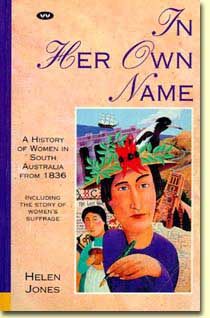
Political Awareness | In Parliament | The Workplace | Why South Australia?
The Aboriginal Voice | Cultural Diversity

 The
power of the written word
The
power of the written word
Media release by Rosemary Cadden
One hundred years ago in South Australia, millions of words were written - in speeches, articles, letters and Hansard - before women finally succeeded in gaining the right to cast their vote in State elections.
A century later, in the centenary of women's suffrage in this State, many women again chose the written word to celebrate that achievement and to foster further debate, change attitudes and achieve improvements in the areas of democracy and equality.
Numerous books, ranging from In her own name, a history of women in South Australia from 1836 by historian Helen Jones, to Puzzle it out by Valerie Yon, a booklet of crosswords and other word games focusing on women, have been published.
Using the powerful medium of the written word, these women have produced a bookshelf of publications that cover the serious and the whimsical, the general environment affecting women and the individual experiences of specific people.
In her own name by Helen Jones tells the history of changes, from 1836 to the present, that have helped women in South Australia move from subordination towards equality.
It is a political and legal history interwoven with personalities, issues and events, and gives a comprehensive view and perceptive analysis of women's changing status and role in a pioneering Australian State.
In her preface, Helen Jones states: "Near the end of the 20th Century, the emphasis has shifted from the basic right of women to vote towards the need for more women to be in Parliament. That was scarcely a consideration during the suffrage campaign; the fact that women were placed on an equal footing with men as potential Parliamentary candidates came about through the machinations of enemies of the suffrage who wished to wreck the Bill by an unwanted amendment. Their opponents stood firm and accepted the unexpected bounty of the right to stand for Parliament. While the women used their votes responsibly, for many years non attempted to stand for Parliament, to the puzzlement of their 1990s successors. Some reasons for this emerge in the book."
In the developing emancipation of women in South Australia, Helen Jones points out that both men and women frequently worked together to improve women's position, with a number of changes initiated by men.
"At the same time, women did not act as one on women's issues, there were many who ignored the injustices which their own sex suffered and gave support, active or passive, to those anxious to maintain the status quo," she said.
In her book, Helen Jones analyses the motives of some of the groups.
The book also fills many gaps in the relatively neglected period of women's history before the 1960s "a substantial space of 125 years during which the foundations of recent change were firmly laid."
Helen Jones notes that the central themes of women's status have remained constant throughout nearly 160 years of settlement : the legal differentiations between men and women, the realm of domestic work, the recognition by people of both sexes and of varied backgrounds of a want of equality for women, and the strong part played by women themselves in overcoming their disabilities.
Helen Jones states: "By winning the vote, women made a necessary step towards gender equality, but the power of traditional forms has prevented any rapid shift toward substantial equality: that has proved a slow and often painful process."
She said the aims of the notable reformers in South Australia's history - to remedy social ills with long-term solutions backed by public opinion and based in the law - epitomise those of "the many South Australians who have pursued the constant, if elusive, goal of achieving equality for women in a changing society."

| Copyright and this website | Disclaimer | Privacy | Feedback | Accessibility | FOI This page last updated on Friday 11 April, 2014 15:17
|
State Library of South Australia |